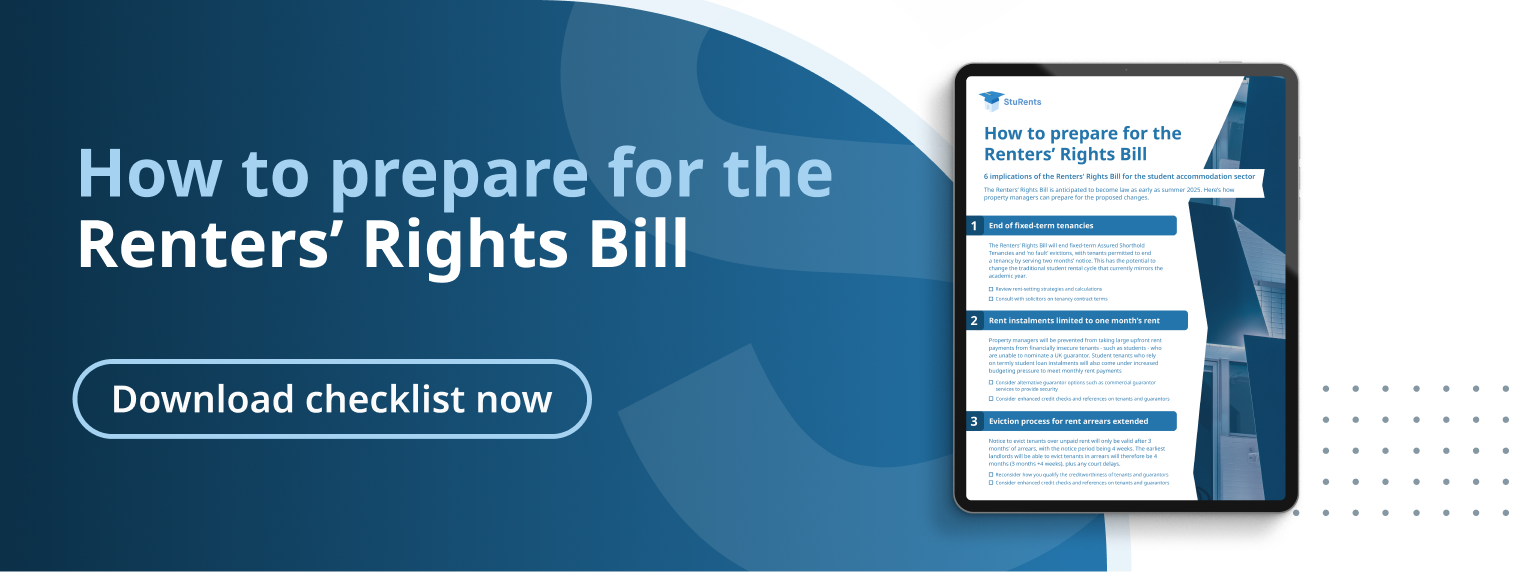
What does the Renters' Rights Bill mean for the student sector?

Image courtesy of Adobe
The Government has now released its draft of the Renters’ Rights Bill. Following multiple false starts under the previous government, there is an air of certainty that this legislation will rapidly make its way into law given Labour’s manifesto commitments. Housing Minister Matthew Pennycook has even suggested it may be in place by summer 2025, with all existing tenancies automatically converted to periodic tenancies rather than any phased approach that may have previously been assumed.
Many of the provisions included are continuations of the key themes covered in the previous governments’ Renters’ (Reform) Bill, though there are differences around some of the more contentious issues that the Conservatives wrangled over. But with many student property managers gearing up for the house-hunting season that kicks off in October (for tenancies starting in summer 2025), they will likely want to pay close attention as the proposed law has implications for the tenancies they will be signing with tenants over the coming months.
Farewell to fixed term
First and foremost, the end of fixed term ASTs — which have been the mainstay of student accommodation for years — will present new challenges to the student sector. While there are provisions for possession of student accommodation (ground 4A) to allow the rental cycle to mirror the cadence of the academic year, tenants will be able to serve two months’ notice to end a tenancy. As a result, more PBSA operators will likely investigate a pivot over to licence agreements to hedge this risk, but property managers with HMO portfolios will struggle to justify a similar move and will consequently see a portion of their portfolio come available outside the typical rental cycle. As a result, house-hunters may see rents increase in the short term as landlords look to price in potential future increases in void periods and increased costs such as those resulting from council tax liabilities on empty student properties.
Rent shake-up
As was the case with the Conservatives’ Renters’ (Reform) Bill, rent instalments will be limited to one months’ rent, presenting one of the biggest changes within the student sector to both property managers and students. Property managers typically align rent instalments with the release of termly maintenance loans, so students in England and Wales will face cash flow and budgeting pressures unless maintenance loans are migrated to monthly instalments, as is the case in Scotland.
The bill is also set to shake up how rent is typically structured for international students. Most international students are unable to provide a UK guarantor and are therefore required to pay upfront for the year; with this set to be outlawed, we are likely to see property managers expand their use of commercial guarantor services or pivot to using licence agreements where applicable in the case of PBSAs.
Labour’s version of the bill also extends the grace period afforded to tenants for rent arrears to 3 months' rent, only after which a section 8 (ground 8) notice can be served (itself a four week notice period leading to eviction). With the prospect of four months of rent arrears before any eviction is effective, property managers will need to reflect on how they appraise the creditworthiness of tenants and guarantors (many property managers in the student sector currently choose not to conduct full references on guarantors) and consider alternatives like commercial guarantor services.
One of the core aims of the bill — and something championed by tenant forums — was, of course, protections for tenants against excessive or punitive rent increases. Unsurprisingly, this provision has been carried forward from the Conservative's version of the bill. Any rent increases a landlord is hoping to implement will need to be communicated via a section 13 notice (2-month notice period), with tenants able to challenge the proposed increase in the First Tier Tribunal if they feel the new rent is above what the landlord could expect if letting to a new tenant on the open market.
Decent homes for all
The student rental sector has come a long way in the last few years in improving the quality of student accommodation. That said, there are still bad actors renting out unfit properties to tenants, often exploiting the fact that many cities are undersupplied with quality accommodation. Rightly so, the Renters’ Rights Bill will help to root out those landlords by extending the Decent Homes Standard to the PRS, with a new National Landlords Register requiring landlords to register and demonstrate compliance with the Decent Homes Standard. Those who fail to address serious hazards can be fined up to £7,000 and may face prosecution for non-compliance. Awaab's Law will also be extended to the PRS, ensuring strict timeframes are in place for repairs of health hazards.
Best of the rest
- Tenants will be allowed to keep pets, with property managers banned from unreasonably refusing. Landlords will, however, be allowed to demand the tenant take out pet liability insurance
- Property managers will not be allowed to reject tenants on benefits or those with children
- A new Private Rented Sector Landlord Ombudsman for PRS will be set up to provide impartial binding resolutions reducing the need to go to court over disputes
- Property managers will be banned from asking for, encouraging, or accepting any bids above the marketed rental price in an effort to combat 'bidding wars' for properties
How to prepare for the Renters' Rights Bill
To find out more about the upcoming changes the Renters' Rights Bill will bring and how you can best prepare, download our free checklist today.
Share


